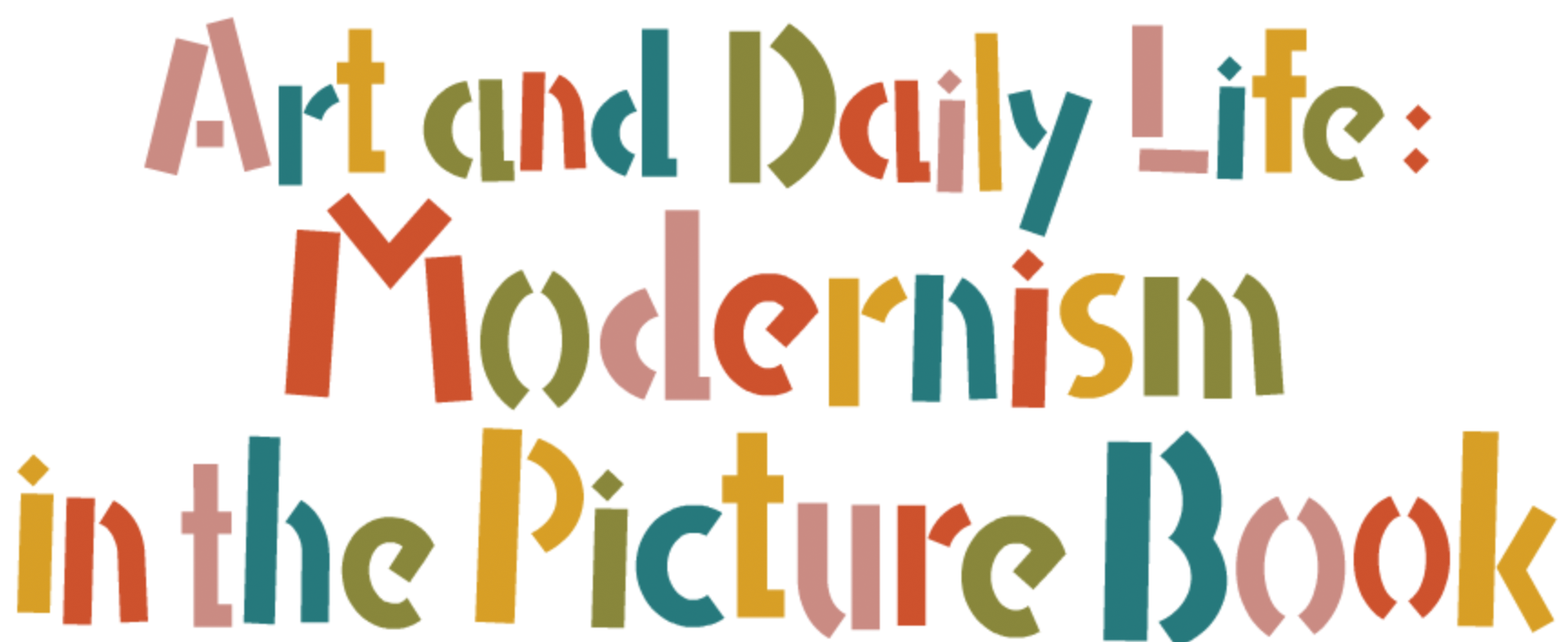本文
Bibliography
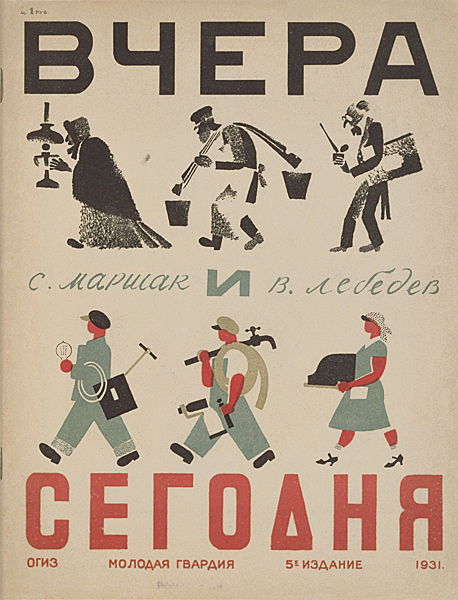
Yesterday and Today
Вчера и сегодня
OGIZ; Leningrad.
1931(1925),
12 pages.
290x223 mm.
© by permission of Aleksandr Marshak, Iakov Marshak, and Ada Lazo
We thank Mr.Aleksandr Marshak, Mr. Iakov Marshak, and Ms. Ada Lazo for giving permission to use Yesterday and Today.
1/15
Yesterday and Today

2/15 Push an image to enlarge
(♪) Yesterday and today. By Samuil Marshak. Illustrated by Vladimir Vasil’evich Lebedev.
Yesterday and Today
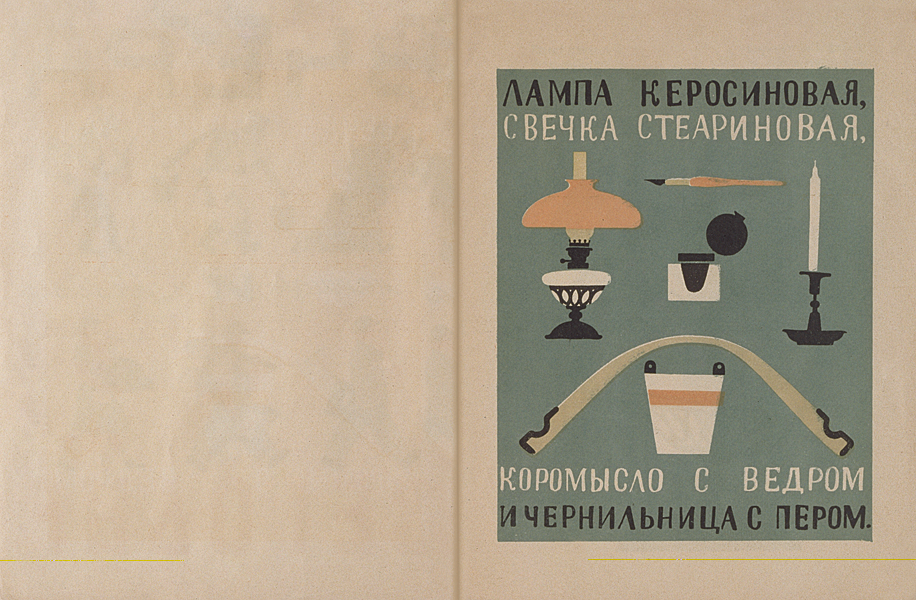
3/15 Push an image to enlarge
Old oil lamp. Stearic candle. Bucket and carrying yoke. Pen and ink pot.
Yesterday and Today
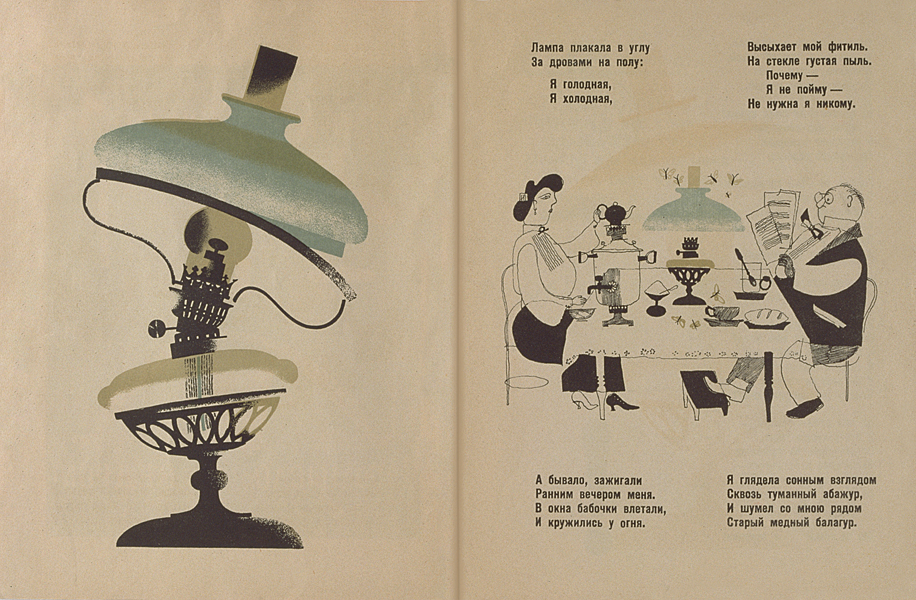
4/15 Push an image to enlarge
(♪) Old oil lamp lay in the corner. Sniffling in the shadow of the firewood pile. “I am hungry, I am cold. My wick has dried up. My lampshade is covered with dust. I don’t understand! Why is it that nobody needs me!” “It used to be that when the dusk arrived I would be lit. Moths would come through the window and flit around my flame. Through the shade of the lamp I would gaze idly at the chattering old copper samovar steaming noisily beside me.”
Yesterday and Today
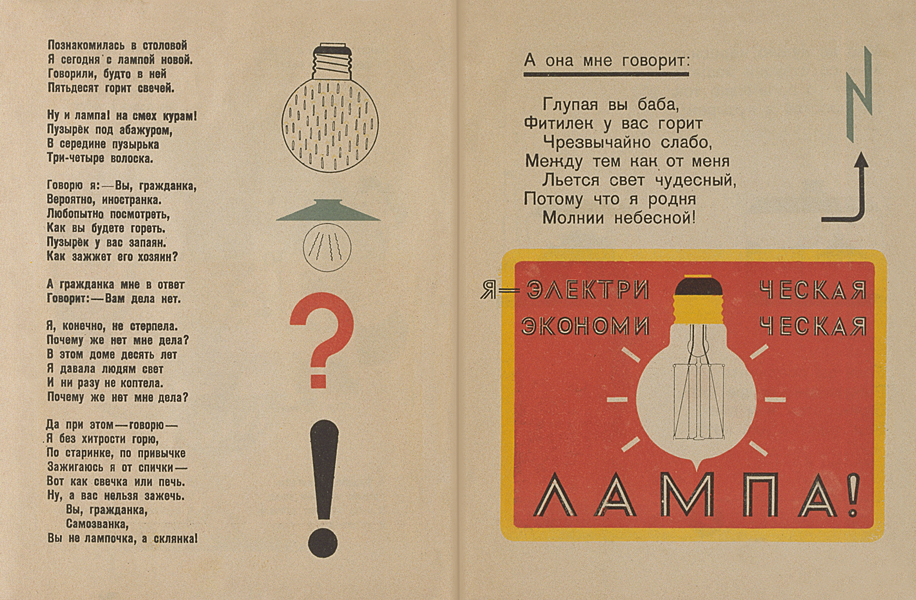
5/15 Push an image to enlarge
(♪) Today, in the dining room I made the acquaintance of the new lamp. I was told that the new lamp had one hundred candles burning inside it! Who ever heard of such a lamp! What a joke! Under the lampshade there is nothing but a little glass bottle with only three or four wires inside it. I dared to say “You must be from a foreign country, it must be curious to see how you glow. Isn’t your bottle soldered closed? How does the master turn you on?” Then the new lamp answered “Why should I tell you?” I could not keep my patience any longer. Why should I be spoken to like that? For the last ten years I had been shedding light in this house for everybody. I never failed them even once. Why does everyone now ignore me? And then I even added “It is easy to light my wick. Just as it has always been done, since time immemorial. Light me with a match just like a candle or the fire in the fireplace. But you cannot be lit like that. You, you must be the swindler, you are not a lamp, Just a teeny glass bottle!”
(♪) Then, the new lamp said “Don’t be a fool! Your wick has just a very small flame, doesn’t it? Compared to that I generate a great deal of light. Because I am a relative of lightening that streaks through the sky! I am lit by electricity. I’m the economical light bulb!”
(♪) Then, the new lamp said “Don’t be a fool! Your wick has just a very small flame, doesn’t it? Compared to that I generate a great deal of light. Because I am a relative of lightening that streaks through the sky! I am lit by electricity. I’m the economical light bulb!”
Yesterday and Today
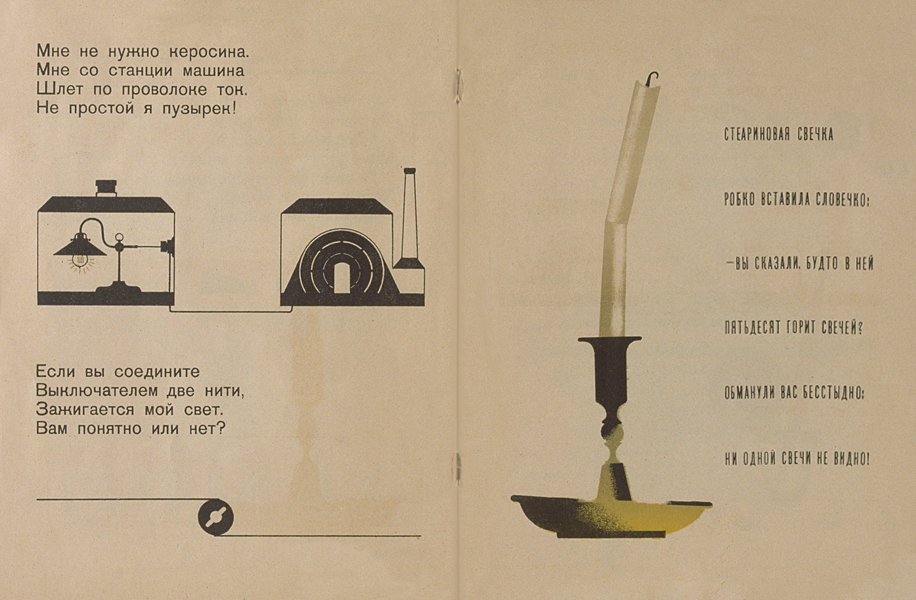
6/15 Push an image to enlarge
(♪) “I don’t need any oil. Electric current flows from the power plant to me through electric lines .I am definitely not just a glass bottle! If you connect the two wires with the switch, I light up. Do you understand? Or is it too much for you?”
(♪) Stearic candle cut in timidly “You said that your new lamp is as bright as the light of 50 candles. But you must have been cheated, there is no candle to be seen!”
(♪) Stearic candle cut in timidly “You said that your new lamp is as bright as the light of 50 candles. But you must have been cheated, there is no candle to be seen!”
Yesterday and Today
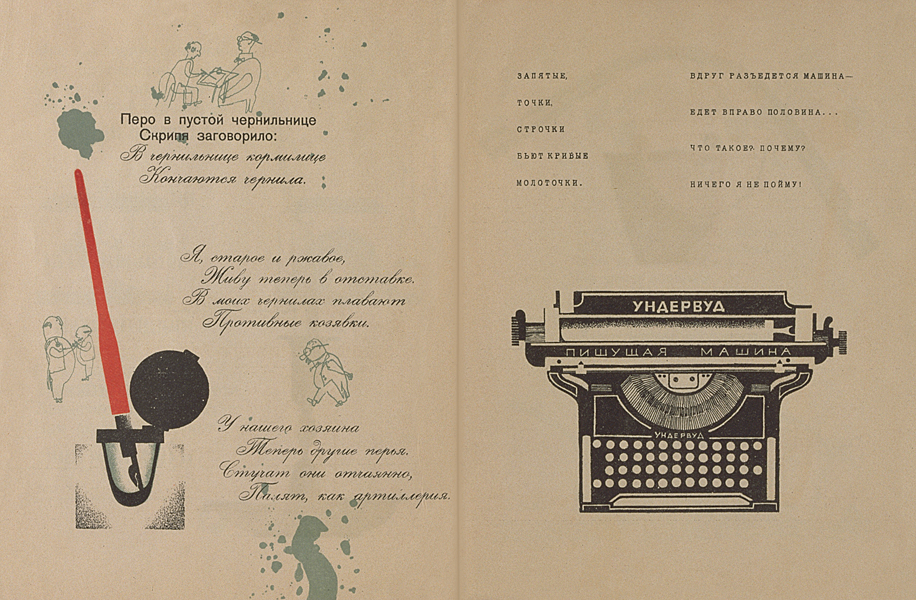
7/15 Push an image to enlarge
(♪) From inside the empty ink bottle came the hoarse voice of pen. “The ink that is my staff of life is almost gone. Worn out and rusted, I’m long since retired. Cursed vermin swim in my ink. These days, my master possesses many other kinds of pens.” The pens are like something gone crazy and clatter away like a machine gun.
(♪) Commas, periods, sentences, line by line are cast over the paper by a bunch of crooked hammers. Then suddenly, the machine moves to the other side. Half of it moves to the right. What happened? Why is it? I do not understand at all!
An Underwood typewriter.
(♪) Commas, periods, sentences, line by line are cast over the paper by a bunch of crooked hammers. Then suddenly, the machine moves to the other side. Half of it moves to the right. What happened? Why is it? I do not understand at all!
An Underwood typewriter.
Yesterday and Today
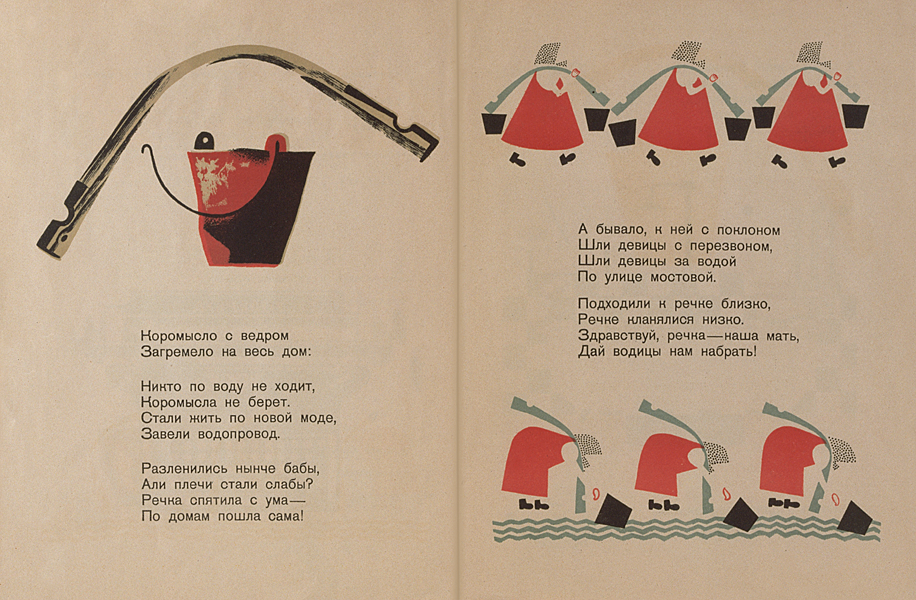
8/15 Push an image to enlarge
(♪) The lament of the bucket with a shoulder pole reverberates through the house, “Nobody goes to draw water anymore. Nobody uses my yoke anymore. Everybody has started the new life. Water is supplied by conduits and pipes. Now, have all the women become lazy? Are they all weak in the shoulders? There’s something wrong with the river, too! To think that the water flows from house to house by itself!”
(♪) Once the girls bowed their heads to the river walking down to draw water. There was the busy sound of their shoes clattering on the stone pavement. When they approached the place to draw water, they reverently bowed to the river saying, “How do you do, mother river, please allow us to draw water.”
(♪) Once the girls bowed their heads to the river walking down to draw water. There was the busy sound of their shoes clattering on the stone pavement. When they approached the place to draw water, they reverently bowed to the river saying, “How do you do, mother river, please allow us to draw water.”
Yesterday and Today
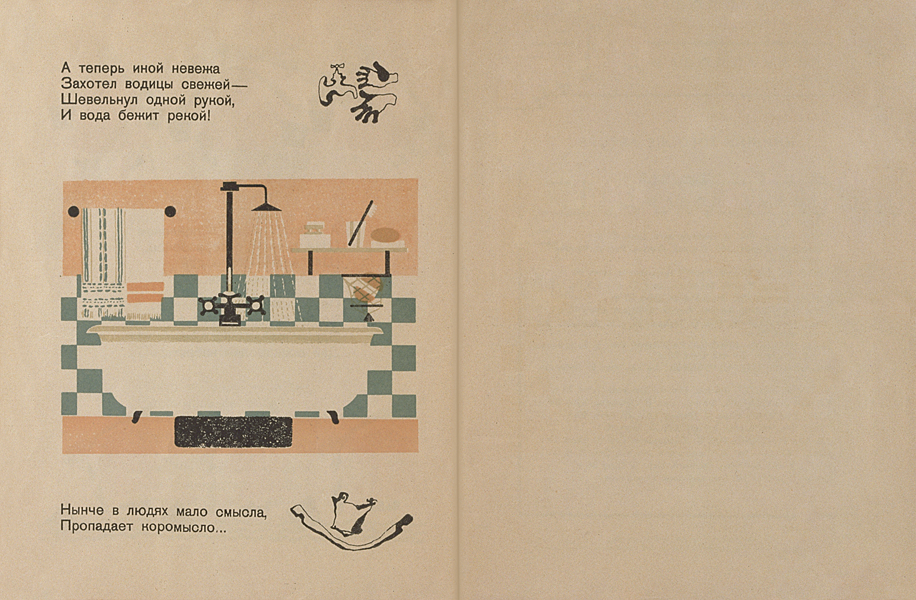
9/15 Push an image to enlarge
(♪) Now, such good manners are gone. When they need clean water, all they have to do is turn the spigot with one hand and the water flows like a river! Now, no longer used. The old shoulder carrying poles are gradually disappearing from sight.
No narration on page 10
Yesterday and Today
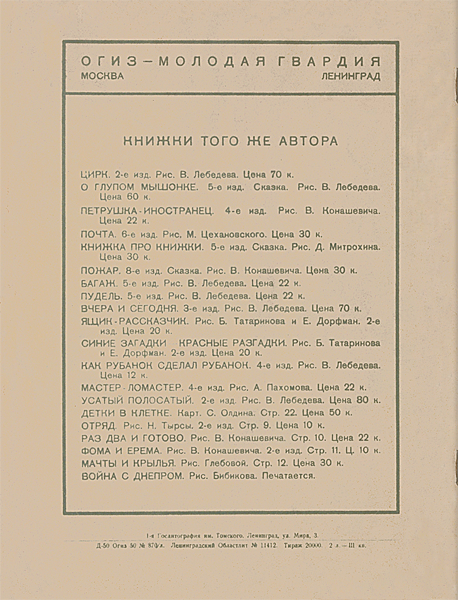
10/15 Push an image to enlarge
No narration on page 11
About the author 1/4
By Samuil Marshak (1887–1964)
Pictures by Vladimir Lebedev (1891–1967)\
1)
After the Russian Revolution and the establishment of the Union of Soviet Socialist Republics in 1917, the process began of creating a literature for the young people who would be the future leaders of the new country. Samuil Marshak put out many works of poetry, plays for children, and translations, together with Maksim Gorkii and Kornei Chukhovskii playing a leading role in establishing the foundations of Soviet children’s literature.Born in Veronezh, a southern part of Moscow as the son of a poor Jewish factory craftsman, Marshak began writing poetry early in life, and his talent was eventually discovered by the well-known critic Vladimir Stasov, who introduced him to Gorkii, opening up for him the path into literature. He went to study at the University of London when he was twenty-five.
11/15
No narration on page 12
About the author 2/4
2)
After the Revolution of 1917 Marshak founded a children’s village for war orphans as well as a children’s theater. His first works of children’s literature were plays. In 1922 he organized the children’s literature studio in Leningrad (St. Peterburg) and trained many writers. In 1924 he became the head of the state publishing house Gozidat and, at the first Soviet Writers Congress (Sezd Sovetchikh Pisatelei) in 1934, presented a special report titled “Bol’shaya literature dlya malen’kikh” (Great Literature for Little People).Marshak’s poetry is bright, simple, clear and humorous. Many of his works have been favored and reprinted. He is well known in Japan also for his play for children “Twelve Months” and the Slav story “Dvenadtsat’ mesyatsev Slavyanskaya skazka,” which is known by its Japanese title “Mori wa ikite iru” (The Forest Is Alive).
12/15
No narration on page 13
About the author 3/4
3)
Lebedev was a leading illustrator of the golden age of Soviet picture books. Born in Petersburg, he studied at the Akademiya khudozhestv (Academy of Art). After the Revolution from 1920 to 1922 he worked for Okon Rosta (Rosta Window), making political posters in St. Petersburg. In 1924 he was put in charge of the art department at Gozidat.As an artist Lebedev was called the perfect match for Marshak in pursuing the potential of picture books. Together they created many masterpieces including The Circus, Ice Cream, Baggage, and Yesterday and Today. With the advent of Socialistic Realism, however, the free, satirical, and humorous quality of Lebedev’s art that had developed under the influence of the Russian avant-garde was not accepted, and he was severely criticized in the party organ Pravda. Accordingly, toward the end of the thirties Lebedev’s style changed to more lyrical themes as exemplified by such works as Twelve Months (short stories, 1943) and Tikhaya skazka (Quiet Stories).
13/15
No narration on page 14
About the author 4/4
4)
Yesterday and Today (1925) tells the story of how the old necessities of daily life were replaced by new ones, the electric light taking over the job of the oil lamp, the pen defeated by the convenient typewriter, and the shoulder-yoke for carrying buckets of water rendered unnecessary by water supply that brings water into the house at the turn of the tap. The personified household furnishings remember the old days, expressing vexation with their fate. The inventive illustrations keep a lively pace with the rhythm of the poetry recounting the joys and sorrows of life.
14/15
Contents
15/15
